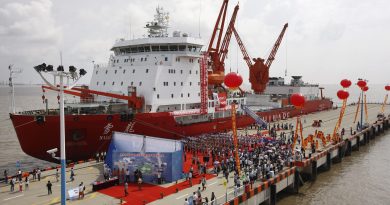The Role of Communities in Canada’s Northern Strategy
This week, the Federation of Canadian Municipalities issued a report on the role of municipalities in Canada’s Northern Strategy. Entitled On the Front Lines of Canada’s Northern Strategy, the report makes three specific recommendations: 1) to develop a long term and coordinated plan to invest in northern infrastructure; 2) to make Canada’s north a world leader in climate change adaptation, and export the lessons and policies we learn to other regions of the globe coping with such changes; and 3) to use smart military investments as the backbone for building the New North. Here, the report highlights the ways in which other circumpolar countries have used military investments to support the infrastructure needs of their northern communities, and sees an opportunity to do the same with the billions in military investments announced since 2007 for the Canadian North.
Written by Dr. Ken Coates and Dr. Greg Poelzer of the University of Saskatchewan’s International Centre for Northern Governance and Development, the report rightly underscores the role municipalities must play in order to achieve the four main objectives of the Northern Strategy. The social, economic and political challenges most pressing in the North are local in nature, and can only be resolved with close collaboration between local, territorial and federal levels of government. As the authors argue, the resources and attention currently being allocated to the Arctic, particularly those that are military in nature, provide a unique opportunity to build a platform to support future development and prosperity.
Of course, much of this is easier said than done. Paradoxically, northern municipalities are both the key and the biggest challenge facing northern development. It has long been recognized that local governments are training grounds for future leaders, and, as the report points out, in many cases it may be the only outlet residents have for participating in community life. This is particularly true in northern and aboriginal communities, where civil society may be weak or non-existent. Although northern communities face high unemployment, there is an acute shortage of skilled labour, and the many levels of government – indigenous, territorial, and federal – lack the human resources needed to accomplish the myriad responsibilities they have been assigned. Strengthening local government, and local governance, will facilitate the long and arduous task of capacity-building in the North.
On the flip side, the small and remote communities of the territories are extremely expensive to maintain. Despite being the most heavily subsidized population in the world (about $18,000/capita in Yukon and NWT, and $32,000 in Nunavut), northern communities still lack many of the basic services we take for granted in the South. Labour and materials are difficult to obtain. Extreme cold and permafrost necessitate special construction methods. Energy is expensive and needs to be imported – northern communities are not on the grid. When combined with the global trend towards urbanization, it becomes clear that northern communities are facing an uphill battle. Aside from the territorial capitals and a few lucky communities that may benefit from federal largesse (such as Cambridge Bay and its research facility, and Resolute Bay and its Canadian Forces Arctic training centre) it is hard to imagine anywhere near enough financial support reaching the more remote communities to develop even a minimum standard of housing, infrastructure and services. Increased federal funding may be one answer, but even this will prolong the dependence and concomitant lack of autonomy that many indigenous communities want and need.
How will northern municipalities deal with these and other problems in the future? While there are no easy solutions to these problems, this report provides an important examination of this previously overlooked aspect of northern development. Hopefully it will serve to spark a much overdue national dialogue on the challenges facing northern municipalities.



